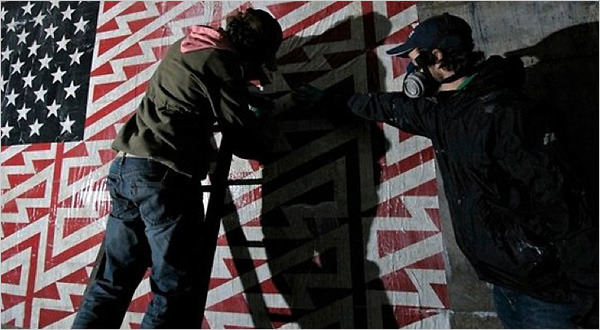
Even as Banksy is busy working for The Simpsons, the authentic street-art scene has gone, literally, underground. Today's NYT has a piece by Jasper Rees about a new exhibition of street art that is so hip that the gallery's existence is a secret, almost no one has seen the art, and the whole show actually closed the very night it opened.
It sounds like a parody -- something that Mr. Brainwash might get up to -- but it seems to be the genuine article. The gist of it is that some street artists found their way into one of Manhattan's handful of abandoned subway platforms, and decided to decorate the place with street art executed by some of the hottest upandcomers in the business.
Called "The Underbelly Project", the exhibition hits all the usual authenticity-hoax plot points: Popularity is for sell-outs, capitalism is bad, art that no one sees is sacred, and the extreme authenticity of the exercise is underwritten by the fact that it is illegal:
Known to its creators and participating artists as the Underbelly Project, the space, where all the show’s artworks remain, defies every norm of the gallery scene. Collectors can’t buy the art. The public can’t see it. And the only people with a chance of stumbling across it are the urban explorers who prowl the city’s hidden infrastructure or employees of the Metropolitan Transportation Authority. That’s because the exhibition has been mounted, illegally, in a long-abandoned subway station.
The whole thing strikes me as a more extreme version of the ephemeral Sufjan Stevens song, that you can only hear by trecking to the owner's apartment in Brooklyn. What becomes of art in the age of digital reproduction? It becomes a commodity—cheap, ubiquitous, and disrespected. One surefire way of restoring the lost, sacred halo of meaning around the unique work is to make it inaccessible and transitory -- accessible only to the lucky few, for a limited time.
That's precisely the agenda of the Underbelly project. The Times has a slideshow of the artworks online, many of of which match the dark, underground, and illegal nature of the show. There are some giant rats, some images of women in veils, some strange cartoonish totem poles, and a weirdly zigzaggy interpretation of the American flag. In short, the show sounds totally, undeniably, awesome. The fact that I'll never see it makes me jealous of those who have -- which, unfortunately, is kinda the point.
 Monday, November 22, 2010 at 06:21PM
Monday, November 22, 2010 at 06:21PM 

